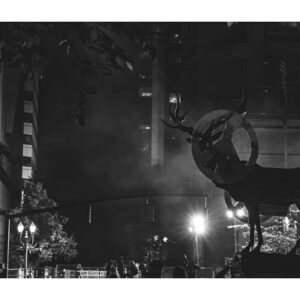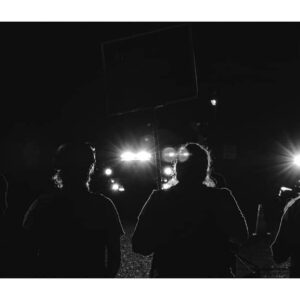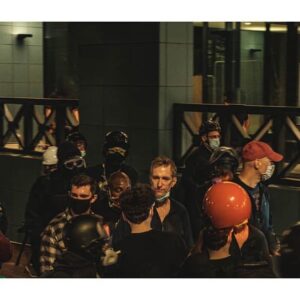Tiffany McGuire, like many of us, found her life thrown into a state of flux when the pandemic hit. Before the spread of COVID-19 mandated shut downs and stay at home orders, she worked in film production as well as performing and producing stand-up comedy. She's maintained a solid community through comedy, however, and her two cats have kept her company through the shut downs.
Aside from having helped organize a 2017 tax day march demanding the release of Donald Trump's tax returns, McGuire didn't have much protest experience prior to the recent Black Lives Matter protests in Portland. “I don’t think anything prepared me for what I have experienced here and now,” she said, as accusations of unnecessary force and unprompted escalation continue to be levied at the police.
Nonetheless, the protests sweeping the nation struck a chord with McGuire. “After the death of George Floyd and seeing what happened in Minneapolis, I started donating to bail funds and supported the protests,” she said, “but concerns about the pandemic were holding me back from participating for the first week.”

As the nation was still early in struggle with the pandemic, and little was at the time known about transmission and effective ways to prevent it, McGuire was not alone in this concern. Data since collected about the spread of the virus indicates that because the protests are outdoors and many protesters are wearing masks, protests themselves aren’t focal points for transmission. (1) At the beginning of the protests however, the fear of contracting and spreading COVID-19 was prevalent.
“Then I remember seeing an Instagram video that encouraged white people to put their white bodies in front of Black bodies,” McGuire said, “a term some find cringe now, I realize, but it spoke to me so profoundly. I wanted to use my privilege if possible and help where I could. So I went out for the first time on May 31st. I was tear gassed by PPB at close range the very first night I was out. It was horrific, and from where I was standing, totally unprovoked. It really lit a fire in my personal determination to keep showing up.”
While McGuire stresses that she is not a leader in the BLM movement or the protests, and that she isn’t a reporter, it became important to her to act as a witness to what was happening. “I started to realize that...I was the only connection some people had to what was happening here,” she said. “I felt a responsibility to both witness what I felt was wrong on the ground, and relay it to those in my circles. I started taking footage of what I felt were key moments and sharing them through Instagram stories, which seemed like a safer and more compelling option than live streaming for a variety of reasons.”

Though some protesters continue to livestream as a means of broadcasting events live and unfiltered, others refrain from this practice or actively discourage it. Though reasons may vary, some of the most common reasons to not livestream is safety and privacy. There is a very real worry about inadvertently compromising someone’s identity or compromising a movement by inviting disruption from authorities. (2) Furthermore, there have been reports of authorities using live stream footage and other recordings from protests to target protesters for arrest at later dates. (3)
Despite the risks that protesters have and continued to face, from fears about COVID-19 to the very real threat of retaliation from police and from the feds, people continue to show up to Portland’s protests every night. The willingness of protesters to put themselves on the line night after night even became its own rallying cry: “Stay together, stay tight, we’ll do this every night.”
“This is a leaderless movement with many moving parts,” McGuire said, reminding us that the movement is based in communal support, assistance, and shared values and momentum. “But I’ve seen so many young Black men and women and [non-binary folks] give speeches and lead marches and stand totally fearless in the face of intense violence. When you see that, it makes you want to step up and be much braver yourself.”

As one of our previews interviewees highlighted, “Courage is contagious.” Many who have attended the protests speak of how touching and inspiring it is to witness and be part of a movement that draws people from all walks of life to donate time, energy, and skills to a common cause. “Most of the incredible memories I have are of people finding ways to be helpful and going out of their way to care for each other,” McGuire said. “Whether it has been feeding thousands of people [barbeque] every night or providing snacks or water or first aid or legal resources or safety gear, so many people find meaningful ways to contribute and fill vital roles. Whenever anyone gets hurt by law enforcement, any number of individuals come to their aid, medics or not. This has become a makeshift community and it’s driven by a moral imperative.”
Reflecting on powerful moments she’s witnessed at the protests, McGuire notes that one of the most powerful she’s witnessed is likely to also be a controversial one. “[O]ne night I was up front near the fence and suddenly the whole fence was lined with ropes and chains and hundreds of people started pulling it down all at once and it was one of the most powerful things I’ve ever seen.” The fence in question was erected by federal agents around the courthouse.

“If someone looks at that as a breach of the fence, and a threat, they might not get it. But there, where that fence was not needed or welcomed, where it never should have been, where it’s a symbol of the violations of rights for a whole city, the fence coming down was a righteous and profound moment of revolt. The building was never in jeopardy because it was never about the building.”
The building in question, a federal courthouse that has been the focus of many protests, has functioned both as a symbol and a bargaining chip. Depending on who you ask, there may be a wish to occupy the building as a means to force city and state leaders to negotiate abolition or defunding the PPB or more introduce meaningful legislation addressing the needs and protection of black, indigenous, and other people of color (BIPOC) individuals and communities; others see the federal building as a symbol of injustice and inequity that disproportionately affects BIPOC communities, while still others see it as a symbol for the justice they are striving for. This makes it a perfect staging area for protests against policing practices that punitively target BIPOC communities.
“I never touched the fence but I definitely cheered when it came down. I used to be tempted to ‘peace police’ other protesters but after seeing and experiencing all of the violence from law enforcement and hearing them use a fence to justify that violence, I have no interest in doing that anymore,” McGuire said. “Honestly, fuck the fence.”
Just as many may not understand the importance of the federal courthouse in these protests, a lot of misunderstanding has circulated regarding the protests generally. “The internet has been a nightmare of misinformation since the protests started around the country and especially since Portland has been getting national press,” McGuire said. “We came out here protesting police brutality and we were met with police brutality. Then we’re somehow accused of being violent. It’s so backwards. City and state and federal officials love to inflate the verbiage of the actions of protesters to sound scary so they can justify their use of force but I have never seen a protester be physically violent toward an officer. I have, however, seen endless violence from officers toward protesters. Law enforcement shows up in riot gear and will declare anything and everything a riot, but they’re the only ones rioting.”
There is an absurdity to the assumption that the protests are actually riots happening night after night, McGuire points out. “To think hundreds and sometimes thousands of people are rioting every night for months and all we’ve managed to accomplish is a minor amount of property damage is just bizarre and absurd and yet somehow a whole subset of the country believes it,” McGuire said. “It’s confounding.” Meanwhile, in response to the violence protesters have experienced at the hands of police, many protesters have seen a necessity to come prepared for violence, however peaceful the intention of the protests may be. “We started showing up in protective gear to defend our bodies from their attacks, but none of us are armed. They are armed to the teeth. They show off their weapons and use them against us constantly.”
In other areas of the country, Black Lives Matter protests have seen a number of victories. This includes the banning of no-knock warrants in Louisville, Kentucky, where Breonna Taylor was killed in her home by officers who forcibly entered utilizing a no-knock warrant; (4) a push to disband the police in Minneapolis, where George Floyd was killed (though this effort has since stalled); (5)(6) many more areas are considering cutting police budgets and reallocating funds to preventative community resources, while Congress has promised legislation on massive police reform, and more. (7) With little to no response from officials in Oregon, however, it can be hard to know what has been accomplished in Portland specifically.
“I think there’s a real fear we’re being placated by those who claim to have learned any lessons without any substantive change taking place,” McGuire said. “[I]t’s interesting that the mayor recently apologized for the local police and their excessive use of force after he himself was tear gassed by federal officers. It feels entirely empty after we experienced that for 50 days by his own force before the feds got here but it’s acknowledgement,” she said, later pointing out that despite this public apology, the PPB (for which Mayor Wheeler serves as the commissioner) has returned to using teargas as crowd control. “We’ve also had judges side with protesters and demand that law enforcement stop such aggressive tactics. I want to see long term changes. Of course I want the federal presence out but I also want to see the PPB defunded significantly.

“Nationwide, there’s clearly been a groundswell of support for BLM and a radical shift in understanding of the role of police. I’m hoping that new understanding brings about transformative change. That more and more bureaus are defunded and disbanded and we as a country demonstrate that we possess an ounce of imagination and the capacity to do things a better way.”
McGuire's role of witness, and relaying what she witnesses at the protests online, has drawn a substantial amount of harassment for doing so. The harassment, she says, is nonstop. “[I]t’s been somewhat shocking when I am reading messages from total strangers telling me I deserve violence or I deserve to die.”
Nevertheless, she remains steadfast in her participation and support of the protests, and continues to encourage people to listen to Black leaders and activist groups associated with the movement. “[We need] to get back to the heart of why we say Black Lives Matter,” she said. “Police brutality is a fair chunk of what we’re fighting against now but the movement is much bigger than that. I want people to educate themselves about how this is the civil rights movement of our time and examine which side of history they’re on.”
As the national dialogue around race and racism in America is beginning to change and some states and cities are seeing the fruits of Black Lives Matter protests and activism, the movement as a whole continues to face challenges. In Portland specifically, the use of force against protesters, in particular the use of chemical weapons, has been criticized. PPB racked up more than $45,000 on riot control agents as of June (7) while also facing lawsuits from the American Civil Liberties Union. (8)
“[T]he use of force is traumatizing upwards of thousands of people in this city alone,” McGuire said, speaking to the direct personal cost of the excessive force and escalation tactics PPB and the feds have repeatedly been accused of. She described injuries she received one night during the federal occupation of Portland: “...I was shot twice with impact munitions, sponge grenades specifically. One hit my hand, which was excruciating enough to go to Urgent Care and even a week later, it’s still painful.
“I think the trauma of being tear gassed and shot with munitions and pepper balls and fear of being arrested or (unlawfully) detained scares a lot of people out of participating, and that’s hard to overcome. Some people don’t feel like they can take the risk to even march during the daytime,” she said. These fears are obstacles both to the movement and its need to maintain momentum for the long run, and for people who find themselves genuinely afraid to exercise their rights to free speech and peaceful assembly.
Though federal agents have purportedly withdrawn from the city since this interview was conducted, McGuire described their presence as a frustrating derailment. “As citizens, we have very specific tools at our disposal for protest and the federal government has gone out of their way to take them away from us.”
The departure of federal agents or reduction of their presence has brought reports of more peaceful protests, (9) though clashes with PPB continue to be a nightly occurrence. Even as tensions continue to fluctuate, protesters continue to grapple with the trauma of the violence they’ve witnessed and endured. McGuire herself has, since this interview was conducted, been assaulted by a PPB officer at one of the nightly protests, not only witnessing the trauma being perpetuated by officers but experiencing it first hand. Through all of this, McGuire stressed that it’s important to stay focused on what matters and what is at the heart of this movement.
“[L]isten to Black leaders and Black people about their real life experiences,” she urged. “Believe them. Take them seriously. Let it change you. Let it change our nation.”
(1) Berger, M. (2020, July 08). Black Lives Matter Protests Didn't Contribute to the COVID-19 Surge. Retrieved August 14, 2020, from https://www.healthline.com/health-news/black-lives-matter-protests-didnt-contribute-to-covid19-surge
(2) Kayyali, D. (2018, May 18). Hey Activists: Think Twice Before Livestreaming Protests. Retrieved August 14, 2020, from https://www.wired.com/2017/03/hey-activists-need-think-twice-livestreaming-protests/
(3) Morrison, S. (2020, July 21). How feds used a YouTube livestream to arrest a Portland protester. Retrieved August 14, 2020, from https://www.vox.com/recode/2020/7/21/21332653/portland-oregon-protests-feds-dhs-youtube-livestream
(4) Willis, J., Brown, M., O'Connor, M., Peters, R., & Iannelli, J. (2020, June 11). Louisville Metro Council Bans No-Knock Raids Following The Police Killing of Breonna Taylor. Retrieved August 14, 2020, from https://theappeal.org/louisville-kentucky-ban-no-knock-warrants-breonna-taylor/
(5) CBS News. (2020, June 26). Minneapolis City Council members taking first step toward disbanding city's police department. Retrieved August 14, 2020, from https://www.cbsnews.com/news/minneapolis-city-council-members-taking-first-step-toward-disbanding-citys-police-department/
(6) Bailey, H. (2020, August 06). Plan to disband Minneapolis police halted in city commission vote. Retrieved August 14, 2020, from https://www.washingtonpost.com/nation/2020/08/05/plan-disband-minneapolis-police-department-halted-city-commission-vote/
(7)Riski, T. (2020, June 29). Portland Police Bureau Spent More Than $45,000 on Riot Control Agents and Munitions June 1. Retrieved August 15, 2020, from https://www.wweek.com/news/2020/06/29/portland-police-bureau-spent-more-than-45000-on-riot-control-agents-and-munitions-on-june-1/
(8)Ellis, R. (2020, July 27). ACLU Adds Federal Agencies To Lawsuit Against Portland Police. Retrieved August 15, 2020, from https://www.opb.org/news/article/oregon-aclu-federal-law-enforcement-portland-police-lawsuit/
(9)McEvoy, J. (2020, August 03). Photos: Violence Subsides After Feds Exit Portland Protests. Retrieved August 15, 2020, from https://www.forbes.com/sites/jemimamcevoy/2020/08/03/photos-violence-subsides-after-feds-exit-portland-protests/